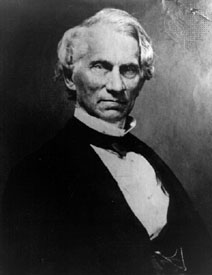Christopher Memminger
| Christopher Memminger | |
|---|---|
 |
|
| 1st Confederate States Secretary of the Treasury | |
|
In office February 25, 1861 – July 1, 1864 |
|
| President | Jefferson Davis |
| Preceded by | Position established |
| Succeeded by | George Trenholm |
| Member of the Provisional C.S. Congress from South Carolina |
|
|
In office February 4, 1861 – February 18, 1862 |
|
| Preceded by | Position established |
| Succeeded by | Position abolished |
| Personal details | |
| Born |
Christopher Gustavus Memminger January 9, 1803 Vaihingen, Würtemberg (present-day Stuttgart, Germany) |
| Died | March 7, 1888 (aged 85) Flat Rock, North Carolina |
| Resting place |
St. John in the Wilderness, Flat Rock, North Carolina 35°16′18″N 82°27′41″W / 35.271667°N 82.461389°W |
| Political party | Democratic |
| Alma mater | South Carolina College |
| Religion | Episcopal |
Christopher Memminger (born Christopher Gustavus Memminger; (January 9, 1803 – March 7, 1888) was a German American politician and one of the founding fathers of the Confederate States. He was the principal author of the Provisional Constitution of the Confederate States, as well as the founder of the nation's financial system. As the first Secretary of the Treasury, Memminger was the main author of the economic policies of the Jefferson Davis administration.
Memminger was born in Vaihingen, Würtemberg (present-day Stuttgart, Germany). His father, Gottfried Memminger, was a military officer who died in combat a month after his son's birth. His mother, Eberhardina (née Kohler) Memminger, immigrated to Charleston, South Carolina, in the United States but died of yellow fever in 1807. Christopher was placed in an orphanage.
Memminger's fortunes changed when, at the age of eleven, he was taken under the care of Thomas Bennett, a prominent lawyer and future Governor. Memminger entered South Carolina College at the age of 12 and graduated second in his class at 16. Memminger passed the bar in 1825 and became a successful lawyer. He married Mary Withers Wilkinson in 1832.
He was a leader of the opponents during the nullification excitement. He published The Book of Nullification (1832–33) which satirized the advocates of the doctrine in biblical style. He entered state politics and served in the South Carolina state legislature from 1836 to 1852 and 1854 to 1860, where for nearly twenty years he was the head of the finance committee. Memminger was a staunch advocate of education and helped give Charleston one of the most comprehensive public school systems in the country. In 1859, after John Brown's raid, he was commissioned by South Carolina to consult with other delegates in Virginia as to the best method of warding off attacks of abolitionists.
...
Wikipedia
